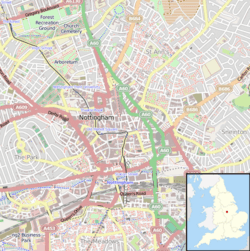Greyfriars, Nottingham facts for kids
| Monastery information | |
|---|---|
| Other names | Nottingham Franciscan Friary, Nottingham Grey Friary |
| Order | Franciscan |
| Established | c. 1224–1230 |
| Disestablished | 1539 |
| Site | |
| Location | Nottingham |
| Coordinates | 52°56′59″N 1°09′00″W / 52.949842°N 1.150113°W |
| Visible remains | None |
Greyfriars Nottingham was a special kind of monastery called a friary. It was home to Franciscan friars in Nottinghamshire, England. This friary was started around 1224 to 1230.
It was closed down in 1539 by King Henry VIII. This happened during a big event called the Dissolution of the Monasteries. Today, the place where the friary once stood is covered by the Broadmarsh Shopping Centre.
Contents
History of Greyfriars Nottingham
Starting the Friary: Early Days
The Greyfriars friary in Nottingham began between 1224 and 1230. The Franciscan order, a group of religious people, first came to England in 1224. By 1230, the friary was already built and active.
It was located in an area of Nottingham called Broadmarsh. The friary's land was next to a road also called Broadmarsh. Canal Street was on its southern side. Today, the Broadmarsh Shopping Centre stands exactly where the friary used to be.
Building with Royal Help
The first buildings at Greyfriars were made of wood. King Henry III, who ruled from 1216 to 1272, helped a lot. He gave many gifts of wood to help build the friary.
In 1230, King Henry donated 20 large wooden beams. These were used to help build the friary's church. Later, in 1232 and 1234, he gave trees from Sherwood Forest. These trees were used to make the church's seats.
In 1247, the King gave 11 oak trees. These were used for the infirmary, which was like a hospital for the friars. They also helped build other parts of the monastery. In 1261, more wood was given for the dormitory and chapter-house. The dormitory was where the friars slept. The chapter-house was where they met.
Between 1326 and 1327, the King also gave wood for a quay. A quay is a place where boats can dock. It's not clear if this quay was on the River Leen or the River Trent. Both rivers were close to the friary.
Building the Stone Church
The friary church was soon rebuilt using stone. King Henry III also helped with this project. In 1256, he allowed the friars to use stone from his quarry in Nottingham.
The new stone church was a big project. It wasn't finished until 1303. Once it was done, the church and its churchyard were officially blessed. The side parts of the church, called aisles or side-chapels, were finished later. They were blessed in 1310.
The Friary Closes Down
Greyfriars friary was closed in 1539. This was part of King Henry VIII's plan to close down monasteries. This event is known as the Dissolution of the Monasteries.
Greyfriars was closed on the same day as another friary in Nottingham. That was Nottingham Whitefriars, and it happened on February 5, 1539. The leader of Greyfriars, called the Warden, was Thomas Basford. He and seven other friars handed over the friary. Their names were Robert Alyne, Francis Bryce, John Chester, Robert Hampton, Robert Morton, Thomas Ryppon, and Roger Stanley.
In 1548, the land where the friary stood was given to a man named Thomas Heneage.
What Remains Today
Sadly, nothing is left of the Greyfriars friary today. The entire area is now covered by the Broadmarsh Shopping Centre. This shopping centre was built in the 1970s.
In 1937, people did some digging and found the friary's southern wall. There was also a local road called "Grey Friars Gate." However, both of these are now gone because of the shopping centre's construction.
A copy of the friary's seal from the 1400s is kept safe. You can see it at the British Museum.
 | Jackie Robinson |
 | Jack Johnson |
 | Althea Gibson |
 | Arthur Ashe |
 | Muhammad Ali |


